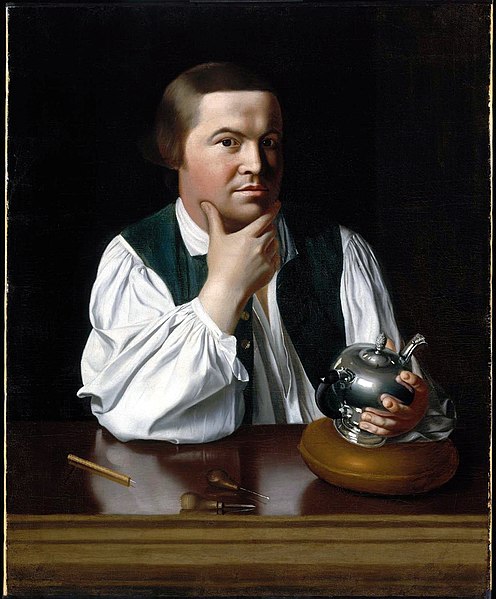 |
| Paul Revere's Ride |
Paul Revere's Ride, 1775
"On the eighteenth of April, '75..." Thanks to Longfellow's poem, most of us remember the date of Paul Revere's Ride, and at least some of the details of the event. The trouble is, some of the details we think we know aren't quite right.First of all, the real concern of the patriots was to warn John Hancock and Samuel Adams. Adams and Hancock were both wanted by the British, and troop movements would mean that they were on their way to arrest them, as well as to confiscate the arms being held in readiness at Concord.
Secondly, Revere wasn't the only messenger. Revere and William Dawes both rode out to deliver the warning, Revere taking the route directly from Charlestown to Lexington (where Hancock and Adams were) and Dawes taking a longer route by way of the Boston Neck. Dawes was less well-known than Revere, and it was thought less likely that he would be recognized and stopped. The riders warned patriots they met along the way, who set out to spread the message as well. Before the night was over, there were probably about 40 men spreading the news.
That business with the lanterns in the Old North Church? Well, that did happen, but not for the reason you might think. Revere and Dawes already knew which way the British were coming. Revere had made arrangements with the sexton of the church, Robert Newman, and Captain John Pulling to raise the signal for the residents of Charlestown. If both Revere and Dawes were captured, someone else needed to know that the British were on their way.
 |
| Portrait of Paul Revere by John Singleton Copley |
After warning the two men in Lexington, Revere and Dawes decided to go on to Concord to warn the militia. At this point they were joined by a local doctor, Samuel Prescott, who was returning home at 1:00 am. (He had been visiting a lady.) There was no triumphant entry into Concord by Revere, however, as portrayed in Longfellow's poem. The three men were stopped by British troops at a roadblock. Dawes and Prescott escaped, although Dawes was unhorsed and ended his ride there. Prescott alone continued to warn the folks at Concord.
Revere was escorted by the British back to Lexington. When they were nearly there, they heard gunshots and the British officers took Revere's horse and rode on ahead. Revere walked back to the house where Hancock and Adams were staying, and helped them to escape.
A Slow News Day, 1930
On April 18, 1930, at 6:30 pm, the BBC signed on for their newscast and said, "Good evening. Today is Good Friday. There is no news." They then paid instrumental music for a few minutes and then returned to regular broadcasting.That must have been a very good day.
No comments:
Post a Comment